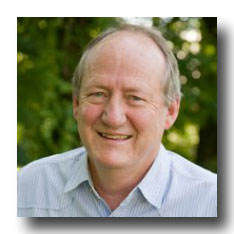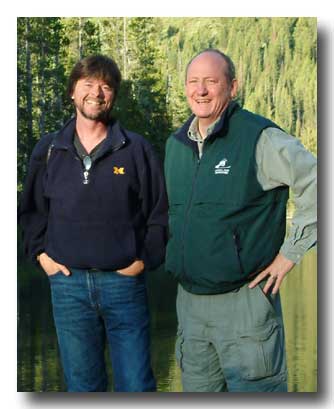| Friends Of The Little Bighorn Battlefield |
The Next Generation In The Study Of Custer's Last Stand |
Interview Dayton Duncan |
| • The Battle • Archeology • Memorials • Little Bighorn Store • News • Book Reviews |
|
Writer and producer Dayton Duncan has collaborated
with Ken Burns on a host of award-winning documentary films -- including The
Civil War, The West, Baseball, Lewis and Clark: The Journey of the Corps of
Discovery, JAZZ, a series of biographies of prominent American historical
figures, and the recent series The War -- that have been the most acclaimed and
most-watched programs in public television history. Their next film, Burns and
Duncan The National Parks: America’s Best Idea, premieres nationwide on PBS
stations September 27, 2009. Recently, Duncan spoke about the film, which explores the
ideas and people behind the creation of America’s national parks. I suggested it to Ken because the parks have been
an important part of my life. When I was taking my children to a number of parks
in 1998, I realized how they really had been formative for me as a kid -- an
important part of who I became. I also realized that the parks were a perfect
topic for us to deal with as filmmakers. I told Ken: “Well, like baseball, like
jazz, national parks are an American invention. Its first tentative expression
was made in 1864 when a President named Abraham Lincoln…” and Ken interrupted
and said, “Okay, we’ll do it.” It took about that long to convince him that this
was a topic that falls squarely in line with what we have tried to do over so
many years in trying to understand who we are as Americans. It’s been a great
experience to learn the history of America’s parks, and if you’ve got to get up
at five in the morning to be shooting as the sun rises, you realize that you
can’t pick a better place to be than at a national park. Our story is about the people who came in contact with those landscapes and were moved so deeply that they devoted themselves to decades-long crusades to try to finally give these places the protection that they needed. If you look at the story of any national park in the United States, you find a person or a small group of people who felt so passionately about it that they said this place has to be saved. Most people think that it is Congress that makes a national park, which is true in a legal sense. But legislators are usually the last in line. It is usually an individual or a group of people actively advocating to an often indifferent Congress, saying, “This place is special, we’ve got to save it,” and finally convincing Congress and the nation to set the land aside and preserve it. So our series is filled with heroes -- people who are entirely unknown to most Americans. These were people from every conceivable background -- from the rich who through their wealth and their philanthropy created parks, to the poor who, for example, gave pennies to help save the Smokies. Every park has its hero and the stories we tell are
about those people and their actions -- which are really the heart and soul of
this series. This is surprising given that that film focuses on these incredibly
beautiful places -- but the parks themselves are not the characters, they’re
actually the stage. Well, I have the best job in America. I don’t even
consider it a job. My “job” is to pick a topic that I’m interested in, convince
Ken that we ought to do a film on it and then begin with what I call sort of a
self-directed, post-graduate degree in that topic. So, for example, for the film
about Mark Twain, I had to read everything that Mark Twain wrote and read
everything written about him. And in this case, a much broader topic, I had to
spend a number of years reading about the individual parks and reading about the
history of the park idea. The second part of it is then to find the people who
know the most about the topic and meet them and talk to them. Then we would
interview them, going out on location. Our research process is also part of our
filming process. So when we’re in a park we might be filming before I’ve ever
written a script. While we’re on location, a Ranger who has shown us a
particular viewpoint may mention some story that we were unaware of -- and that
works its way into the script. It becomes a process of discovery, of not trying
to encompass everything and know it all to begin with and then write a script,
but rather, to have a constant mix of creativity surrounding and informing our
shooting, our research, the writing, the editing and everything else. My first memory of a real trip that my family took -- the only real trip my family ever took -- brought us from a small town in Iowa where I grew up to the Badlands, to Yellowstone, to the Grand Tetons, to Dinosaur National Monument, to Rocky Mountain National Park. I was nine years old and in advance of it, my mother told me that we’d be doing this trip. I spent the winter finding materials from the tourism bureaus, helping try to map the trip. And it was such a vivid memory to me I can almost take it day by day from park to park and remember what we did during that time. I don’t think at the time I realized what an
important moment it was. I became somebody who was interested in history,
someone who’s interested in the landscape, someone who has spent a lot of his
adult life traveling around the United States, trying to learn new things. And
it wasn’t until I took my own family -- when my son was about the same age and
my daughter was about the same age as my older sister -- that I started making
those connections. So parks weren’t a constant part of my life, but they were a
very big moment in my life at a particular important moment in my life. I think the parks are a gift in many ways. They are
a gift of nature to us, to this nation that was blessed with this land. They are
part of who we are as Americans. We’re the people who wrote the Declaration of
Independence, but we’re also the people who went out and inhabited -- and in a
way tried to conquer -- this land, this gift and blessing that was bestowed upon
us. The parks are part of that, they represent what was here. They represent the
potentiality of what the land was like when we, as a nation, first set out. We pass on our nation’s concept of liberty to the next generation -- the same thing is true of a park. It’s there for us to enjoy, but it’s for everyone to enjoy for all time. These are spectacular places. You don’t have to be sentimental about the Declaration of Independence, as I am, to go to a place like Glacier National Park and be awed by what you see. The creation of a park establishes that sense of a
special place. When you enter a park -- you think differently. You pause and it
takes you a little bit out of the rush of time and I think that is why so many
families take their kids back and why those kids will take their kids back
because it encapsulates an imperishable moment that you experience as a child.
Then you can see that experience once again through your child’s experience.
There are very few things that pass across generations and across time the way
that does. That’s what makes it so special. I think the biggest surprise for me, the greatest lesson I learned in making this film is this reaffirming lesson of democracy: that we assume that the parks have always been there. We assume that it is a self-generating, perpetual governmental machine -- that some bureaucracy says “this will be a park and this will always be a park.” And what you learn -- what I learned and I what hope to pass on in the series -- is just the opposite of that. The parks haven’t always been there. They are the result not of the government as much as they are the result of the efforts of individual people. It was just a continual surprise with the story of each park that I looked into, that there were people who changed the fate of that place and the course of history with their actions. They changed history in the sense that those places will be there over the course of time. I believe in democracy and what I wasn’t prepared for were the great lessons of politics and democracy and citizen activism that are at the heart of the park story -- the determination that these places are not only there for us, but for all people to enjoy. And also that all people can have a role in making sure that there are places for all of us to enjoy. It doesn’t happen by itself and it sometimes happens with the help of powerful interests, but most often it was everyday people who changed the course of American history by deciding that a special portion of this great landscape was now going to be sacred and going to be preserved forever. Ken Burns HomeNews & Information Home |
|
||
|
Copyright 1999-2013 Bob Reece Friends Little Bighorn Battlefield, P.O. Box 636, Crow Agency, MT 59022 | Home |
Board of Directors |
Guest Book | Contact | Site Map
| |
|||

